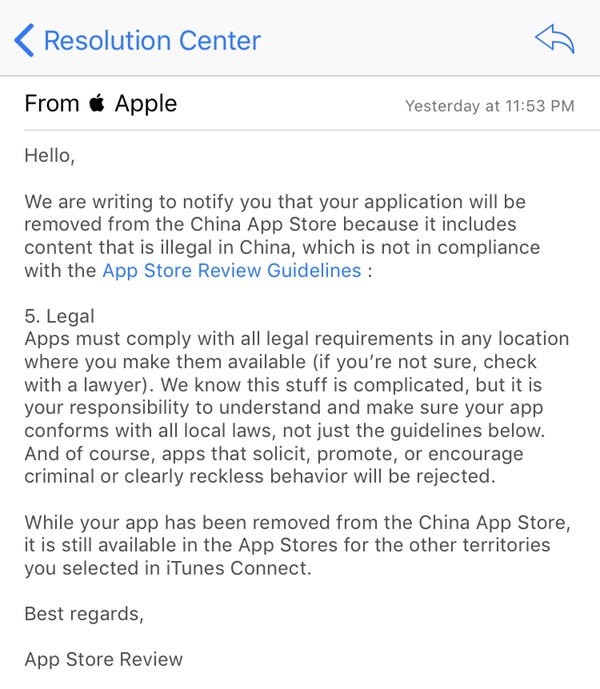Regular readers of We Live Security will know that we have long been proponents of internet users protecting their privacy by installing a VPN on their computers, tablets, and smartphones.
Don't know what a VPN is? Watch this video from ESET.
https://www.youtube.com/watch?v=K_JomGpvjH4&rel=0
Ok, so hopefully we're all up to speed and understand the importance of running a VPN.
But depending on where you are in the world, things may not be so easy.
For instance, this weekend it has come to light that Apple has bowed to pressure from the regime in Beijing, and removed some VPN apps from the Chinese version of its iOS App Store.
In a blog post, ExpressVPN describes how it received a notification from Apple that its iOS app was being removed from the China App Store.

In the email, Apple explained that the ExpressVPN app was being removed from the China App Store "because it contains content that is illegal in China."
 And it doesn't seem that ExpressVPN was being specifically targeted. Other VPN apps, such as Star VPN, also revealed that it had been similarly thrown out of the Chinese iOS App Store, and warned that the move set a "very dangerous precedent which can lead to same moves in countries like UAE etc. where government control access to internet."
And it doesn't seem that ExpressVPN was being specifically targeted. Other VPN apps, such as Star VPN, also revealed that it had been similarly thrown out of the Chinese iOS App Store, and warned that the move set a "very dangerous precedent which can lead to same moves in countries like UAE etc. where government control access to internet."
Certainly VPN software has been unpopular with the Chinese regime, which views their usage as a tool by which citizens might attempt to skirt around the infamous "Great firewall of China", used to censor websites and content deemed inappropriate.
Of course, this is one of the concerns - that authoritarian regimes might use the lack of availability of VPN technology to more easily monitor and censor what people are accessing on the internet, and snoop upon private communications.
But they're not the only group which can exploit weak online security. Criminal hackers can also take advantage of people not using VPNs to spy upon those using insecure Wi-Fi hotspots, and launch man-in-the-middle attacks.
Things perhaps become even more critical if you are business operating in China, which has security standards which require the usage of VPNs to connect to offices remotely, and reduce the chances of sensitive information falling into the wrong hands.
Now, there may be some who will be upset that Apple has caved in to China's demands, and removed VPNs from its app store. But consider this - what else could they do? It's well within Chinese power to revoke Apple's rights to sell products into the country entirely - and the technology company has a long-standing regulation that all apps must conform to the local laws of territories into which they are being sold.
In short, this isn't really Apple's fault - it's China's.
Fortunately, ExpressVPN has noted that the removal of the VPN apps does not necessarily mean that it's now impossible to download a VPN onto your iPhone or iPad if you are located in China. Presently, it appears, you will still be able to download a VPN app for your iOS device if you happen to be able to access another country's iOS App Store:
"Users in China accessing a different territory’s App Store (i.e. they have indicated their billing address to be outside of China) are not impacted; they can download the iOS app and continue to receive updates as before."
Of course, that's unlikely to be an option that most of the population of China will be able to take up.
Thank goodness then that for now, at least, VPN apps running on the Windows, Mac, and Android platforms still appear to be available for Chinese users to download.
Provided, of course, that China's internet firewall doesn't prevent you from accessing their download sites in the first place...




